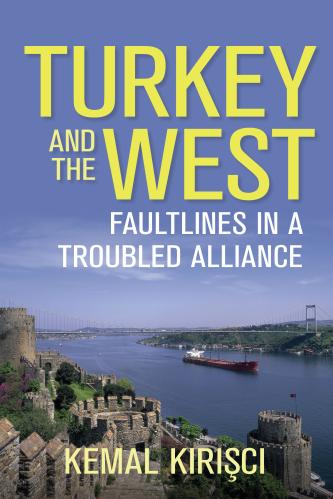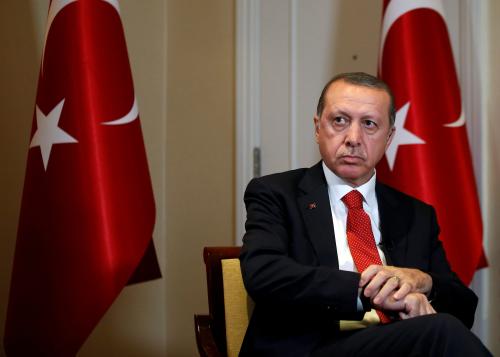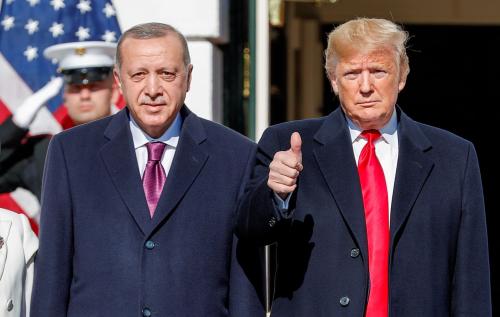After 15 years in government—particularly since a failed coup attempt in July 2016 crowned him with extraordinary executive authority—Turkey’s President Recep Tayyip Erdoğan has never been more powerful.
Yet as the June 24 snap elections called by his ruling Justice and Development Party (AKP) approach, there are growing signs that the political dexterity that has long allowed Erdoğan to determine the course of Turkish politics could be waning. While Turkish polls need to be read cautiously, many of them now suggest a high likelihood that the upcoming presidential election will be decided in a run-off, and that Erdoğan’s AKP will fail to retain its majority in parliament. This would create a completely novel and challenging political picture in which the opposition could have a greater say in policymaking than it has had for at least a decade.
Challenges mounting
Many thought that the decision to move the elections forward by over 16 months was a pre-emptive move by Erdoğan to avoid the damage an increasingly volatile Turkish economy is likely to inflict on his popular support. Both inflation and unemployment are over 10 percent and on the rise, the budget deficit saw a 58 percent increase in the past year, and the lira has lost more than 20 percent of its value against the U.S. dollar this year alone. (The dollar-to-lira rate is now 4.6 to 1; it was 3.75 to 1 in January, and around 2 to 1 as recently as mid-2013.) Nor is the Turkish government able to stem the tide: To the contrary, Erdoğan’s frequent and ideologically charged declarations against high interest rates as well as his recent promise to intervene more directly in the policymaking of Turkey’s Central Bank after the elections are increasingly perceived as contributing to the lira’s plunge.
Amid these economic worries, Erdoğan also faces the most diverse and rigorous pool of opposition candidates since he came to power in 2003. A new electoral alliance hoping to unseat Erdoğan includes not only the center-left Republican People’s Party (CHP) and the new center-right İyi (Good) Party, but also an Islamist faction, represented by the small yet influential Felicity Party—ironically, Erdoğan’s own political home during his rise to political stardom in the 1990s.
The allied opposition parties have each fielded their own candidates, but promise to unite behind whichever candidate makes it to a run-off against Erdoğan. The CHP’s presidential candidate is Muharrem İnce, a fiery orator who was once known for his staunch secularism and perceived as insensitive to the needs of Turkey’s pious Muslims and large Kurdish minority. Recently, however, he has struck a remarkably conciliatory tone on the campaign trail, adopting a narrative embracing Turkey’s ethnic and social diversity, promoting teaching Kurdish in government schools, and declaring that he has no intention to resurrect Turkey’s once-infamous headscarf ban. İyi Party leader Meral Akşener, the only woman in the race, is the first serious right-wing challenger to Erdoğan in over a decade. Finally, the conservative Felicity Party candidate, the British-educated party head Temel Karamollaoğlu, is easing into his role as an elder statesman and is dishing out intense moral criticism of the ruling AKP. The pro-Kurdish People’s Democracy Party (HDP)—which the government has heavily stigmatized—was left outside of the opposition alliance, but its party head and candidate Selahattin Demirtaş remains a charismatic leader for much of Turkey’s Kurds and secular youth. This diversity of options available to Turks of all political and ideological persuasions means that Erdoğan is now challenged from multiple sides and that there is likely to be increased opposition turnout at the polls.
Erdoğan’s vulnerability
Indeed, such a widened political battleground was exactly what Erdoğan hoped to avoid in calling for the snap vote. Turkey’s opposition parties were outraged at what they took as an attempt to prevent Akşener’s newly-founded İyi Party from participating on a legal technicality. This was circumvented when CHP—shrewdly and unexpectedly—allowed 15 of its members of parliament to be transferred to İyi Party, allowing it to attain the minimum number of sitting MPs to qualify to participate in the snap elections.
Erdoğan himself, in what many perceived as a slip that only proved foul play by the government, criticized Turkey’s High Electoral Commission for not pre-empting what he called an “immoral” opposition strategy. Perhaps even more strikingly, HDP’s Selahattin Demirtaş, who has been jailed since late 2016 with multiple charges but still no indictment (let alone a verdict), is forced to run from behind bars while opposition candidates from Turkey’s right and left continue to call for his immediate release.
The AKP’s apparent heavy-handedness is paired with considerable hubris in the lead-up to the elections. The government casually postponed Turkey’s massively important university entrance exams—the culmination of a multi-year process, exhausting for students and financially draining for parents—once it became apparent that they coincided with the planned election date. In a similarly self-assured move, Finance Minister Mehmet Şimşek has noted that Turkey’s troubled markets will see normalization and reform “after the elections,” rejecting out of hand the possibility that the elections may disturb his own policymaking mandate.
But even as the ruling AKP is dismissive of the possibility that Turkey’s next president could be decided in a run-off, Erdoğan himself has been providing much of the fodder for Turkey’s reinvigorated opposition. Phrases lifted cheekily from awkward moments in Erdoğan’s own recent speeches have become humorous opposition slogans. Erdoğan once said he and his party would leave power if and when the electorate said “Tamam” (roughly meaning “okay,” or “that’s enough” in Turkish)—on Twitter, opposition activists have said “T A M A M” in over two million tweets, and the phrase has seeped into daily conversations. Similarly, “Sıkıldık mı?” (“Are we bored yet?” as employed somewhat sheepishly by the president mid-way through a lengthy address to an AKP youth congress) is a phrase that has caught on. İnce, Akşener, and Koramollaoğlu joined in, using the catchphrases both on and off social media often. Indeed, “T A M A M” and “Sıkıldık mı?” represent more than Turkey’s latest social media fad: Their easy and cheerful spread suggests an opposition that is increasingly able to unite around common themes and is rediscovering the tone of youthful irreverence that last befuddled and outraged the AKP government during the Gezi Park protests in 2013. Indeed, a growing number of Turkish commentators opine that it is increasingly the opposition that determines the tone and course of political debate in the country, with AKP officials adopting a clumsily defensive tenor.
And ironically, it may have been the AKP government itself that has exposed Erdoğan’s Achilles heel. In pushing for the constitutional change that concentrated most executive powers in the person of the president but retained certain lawmaking and veto rights in the parliament, AKP lawmakers do not seem to have considered the possibility that the president’s party may not always hold a majority in parliament. Before the constitutional amendment, the fact that the AKP polled significantly higher than its individual competitors meant that it easily dominated the National Assembly; but the multi-party alliances officiated under the new system, as well as a widened political arena, change electoral math in such a way as to make an AKP parliamentary majority harder to achieve.
Precisely because the creators of last year’s constitutional amendment thought that the AKP was invincible at the polls and that Turkey’s diverse opposition was fundamentally incapable of achieving any internal harmony, then, an opposition parliament under an Erdoğan presidency is a real likelihood. The new system makes little provision for such a cohabitation, and an aggressive opposition could effectively cripple much of Erdoğan’s policymaking. Indeed, if the AKP were to lose its parliamentary majority in the first round of elections, Erdoğan would be entering the presidential run-off election with his aura of invincibility and traditional mastery over Turkish politics severely weakened.
Winning votes, fairly
To gain the upper hand, both sides will have to come up with more concrete policy proposals to remedy an ailing economy, prove their willingness to diffuse the country’s suffocating political polarization, and stir the hearts and minds of an increasingly young and well-educated electorate, 1.5 million of whom will vote for the first time in June.
Opposition parties are just starting to roll out their election programs. These programs, in particular, must convince the electorate that their vision is one that goes beyond unseating Erdoğan: It remains unclear, for example, how a politically and legally cumbersome return to the parliamentary system, which all opposition candidates promise, would be achieved. On the question of the economy, İnce in particular is making waves with talk of moving emphasis from an increasingly unwieldy construction sector to boosting high-tech industrial production, and Akşener with a thoughtful critique of youth unemployment. But a thorough and convincing roadmap for much-needed macroeconomic reform has not been forthcoming from either Erdoğan or his opponents. On foreign policy, İnce is unequivocally advocating improved relations with trans-Atlantic allies and the EU. Akşener, while stressing the need for a strong European-Turkish partnership, is critical of the EU for driving Turkey’s membership talks into a dead end, and not surprisingly emphasizes the importance of relations with the Turkic and Muslim world.
But perhaps most critically, all parties—government and opposition alike—should ensure that controversial new election laws should be applied conscientiously, and that the June 24 elections are free and fair without the slightest shadow of a doubt. Any domestic and international perception that the elections have been tampered with would only aggravate Turkey’s mounting social and economic woes. If the worst fears of some commentators are confirmed and incidents of coercion and violence sully the elections or their aftermath, Turkey’s already heated political scene could be brought to the brink.
To go back to the question we pose in the title: Yes, both Erdoğan and his challengers do have a real chance at victory in what may become Turkey’s most contested electoral race in recent history, and the AKP’s own mistakes should show that there is little to be gained by looking at Turkish politics dismissively.
The Brookings Institution is committed to quality, independence, and impact.
We are supported by a diverse array of funders. In line with our values and policies, each Brookings publication represents the sole views of its author(s).







Commentary
Does Turkey’s opposition have a chance at beating Erdoğan’s AKP in June?
May 29, 2018